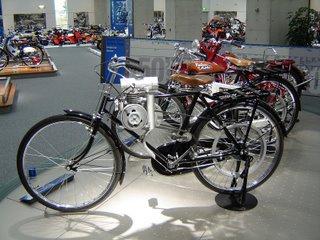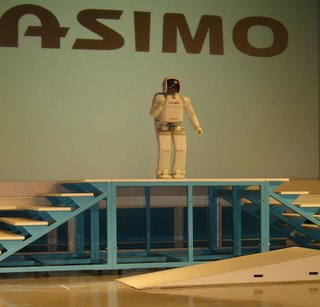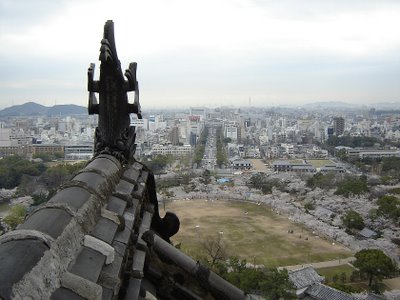RealClearPolitics - Articles - Give Iran Enough Rope
Found via LGF was the above article that suggests waiting on the Iranian issue at the moment. Given the apparent difficulties of "surgical" military action in this case, and the possible regional consequences as well, this seems to be the only option at the moment. (Maybe Israel has nothing to lose if it embarks on some limited operation, but no one seems to think it can do it on its own.)
Friday, May 05, 2006
It's all about fun
BBC NEWS | Health | Britons 'put fun before babies'
Meanwhile in Britain:
The Guardian poll suggested that those quizzed were aware of women's declining fertility, but that they had to balance financial and work pressures against this.
However, most men (64%) and most women (51%) said it was more important for women to enjoy themselves than have children.
A majority also said they believed doing well at work and earning money can count for more than bringing up children.
The report says nothing about how this poll was taken. I suspect that if it was of readers of the left leaning newspaper, the results would be skewed against having children.
The Family Planning Association seems to downplay the fact that people waiting too long means not many people at all soon enough:
A spokeswoman for the Family Planning Association said things had changed both for women and men, with more choices and opportunities open to both.
"There are more things you can do in life, such as going off travelling and going to university.
"But it's actually quite a responsible thing to do, to wait until you are financially secure before having a family so that you can provide for your children."
This may be a reason for delaying children until you are able to work, but otherwise this line of thinking ("we can't start yet, we would have to put off that 3 month holiday in France") is really what fertility experts are trying to warn against.
Meanwhile in Britain:
The Guardian poll suggested that those quizzed were aware of women's declining fertility, but that they had to balance financial and work pressures against this.
However, most men (64%) and most women (51%) said it was more important for women to enjoy themselves than have children.
A majority also said they believed doing well at work and earning money can count for more than bringing up children.
The report says nothing about how this poll was taken. I suspect that if it was of readers of the left leaning newspaper, the results would be skewed against having children.
The Family Planning Association seems to downplay the fact that people waiting too long means not many people at all soon enough:
A spokeswoman for the Family Planning Association said things had changed both for women and men, with more choices and opportunities open to both.
"There are more things you can do in life, such as going off travelling and going to university.
"But it's actually quite a responsible thing to do, to wait until you are financially secure before having a family so that you can provide for your children."
This may be a reason for delaying children until you are able to work, but otherwise this line of thinking ("we can't start yet, we would have to put off that 3 month holiday in France") is really what fertility experts are trying to warn against.
The vanishing children of Japan
The Japan Times Online - Advanced Search
From the above:
The number of children in Japan has been falling for 25 years straight, highlighting the country's aging population and declining birthrate, an annual government survey showed Thursday....
Children 14 and under now make up 13.7 percent the population, down from 13.8 percent a year ago, hitting a record low and declining for the 32nd year in a row. Meanwhile, people aged over 65 account for a record-high 20.4 percent....
The percentage of young children to the overall population in Japan ranks even lower than other aging societies, including Italy, where such children make up 14.2 percent of the population, and Germany and Spain, both of which stand at 14.5 percent, according to the most recent figures.
Must be less and less need for primary school teachers every year.
These are awful figures, which the government will have to deal with in a serious way soon.
From the above:
The number of children in Japan has been falling for 25 years straight, highlighting the country's aging population and declining birthrate, an annual government survey showed Thursday....
Children 14 and under now make up 13.7 percent the population, down from 13.8 percent a year ago, hitting a record low and declining for the 32nd year in a row. Meanwhile, people aged over 65 account for a record-high 20.4 percent....
The percentage of young children to the overall population in Japan ranks even lower than other aging societies, including Italy, where such children make up 14.2 percent of the population, and Germany and Spain, both of which stand at 14.5 percent, according to the most recent figures.
Must be less and less need for primary school teachers every year.
These are awful figures, which the government will have to deal with in a serious way soon.
It's turtle's all the way down
New Scientist SPACE - Breaking News - 'Cyclic universe' can explain cosmological constant
I will expand on this post later.
Update: I think that the news@nature version of this story is much clearer than the New Sdientist one above. (It's a pity that news@nature links are not good for very long.) From the Nature story:
A bouncing universe that expands and then shrinks every trillion years or so could explain one of the most puzzling problems in cosmology: how we can exist at all...
In Steinhardt and Turok's cyclic model of the Universe, it expands and contracts repeatedly over timescales that make the 13.7 billion years that have passed since the Big Bang seem a mere blink. This makes the Universe vastly old. And that in turn means that the mysterious 'cosmological constant', which describes how empty space appears to repel itself, has had time to shrink into the strangely small number that we observe today.
In 1996, it was discovered that the universe is not only expanding but is also speeding up. The cosmological constant was used to describe a force of repulsion that might cause this acceleration. But physicists were baffled as to why the cosmological constant was so small.
Quantum theory suggests that 'empty' space is in fact buzzing with subatomic particles that constantly pop in and out of existence. This produces a 'vacuum energy', which makes space repel itself, providing a physical explanation for the cosmological constant.
But the theoretically calculated value of vacuum energy is enormous, making space far too repulsive for particles to come together and form atoms, stars, planets, or life. The observed vacuum energy, in contrast, is smaller by a factor of 10120 - 1 followed by 120 zeros. "It is a huge problem why the vacuum energy is so much smaller than its natural value," says Carroll.
The "cyclic universe" idea gives lots of time for the vacuum energy to have decayed to its current strength.
What I don't understand is how the collapse of the universe starts in this theory.
I still have a soft spot for Frank Tipler's Omega Point theory, expounded in detail in "The Physics of Immortality." How the cyclic universe idea fits into that, I am not sure. Tipler has not given up on his ideas either, as this relatively recent interview shows. Tipler believes that it is life itself that will cause the slow down in the current acceleration of the expansion of the universe:
So, if the observed acceleration were to continue forever, the Omega Point Theory would be refuted. But the expansion of life to engulf the universe is EXACTLY what is required to cancel the positive cosmological constant (a.k.a. the Dark Energy): as life expands outward, life willl require energy, and before the collapse of the universe provides gravitational collapse energy, the energy source will be the conversion of baryons and leptons into energy via electroweak quantum tunnelling, a process I describe in Section N (relativistic spacecraft) of the Appendix for Scientists. What I did not realize when I wrote my book a decade ago is that this electroweak process would also act to cancel any positive cosmological constant today, and that the net baryon number in the universe would REQUIRE such Dark Energy today.
The weakest part of Tipler's ideas is his suggested method of "resurrection" which (as I recall it) requires every possible version of every person in all of the "many worlds" being re-created by the super advanced computing thing-y that is God at the end of the universe. I had a thought while having a shower recently which seemed a better idea, but it is only a rough idea which I don't want to reveal for now.
I don't always have deep thoughts in the shower.
By the way, for those who may not know, the title of this post is explained at Wikipedia. (I am amazed at what you can find there now.)
UPDATE: The Nature article has links to some more detailed papers about the cyclic model. One I have read quickly is here. It does explain the model more clearly, even though there is much terminology there that is way above my head. Importantly, it seems that the model does not mean the universe shrinks to anything like an Omega Point (a total "Big Crunch") before the next bang happens. (There's some confusing stuff about black holes mentioned in the paper too.) Having read this, it made me realise I had something about this model some time ago in New Scientist.
It's all speculative fun, but at least does seem capable of some testing.
I will expand on this post later.
Update: I think that the news@nature version of this story is much clearer than the New Sdientist one above. (It's a pity that news@nature links are not good for very long.) From the Nature story:
A bouncing universe that expands and then shrinks every trillion years or so could explain one of the most puzzling problems in cosmology: how we can exist at all...
In Steinhardt and Turok's cyclic model of the Universe, it expands and contracts repeatedly over timescales that make the 13.7 billion years that have passed since the Big Bang seem a mere blink. This makes the Universe vastly old. And that in turn means that the mysterious 'cosmological constant', which describes how empty space appears to repel itself, has had time to shrink into the strangely small number that we observe today.
In 1996, it was discovered that the universe is not only expanding but is also speeding up. The cosmological constant was used to describe a force of repulsion that might cause this acceleration. But physicists were baffled as to why the cosmological constant was so small.
Quantum theory suggests that 'empty' space is in fact buzzing with subatomic particles that constantly pop in and out of existence. This produces a 'vacuum energy', which makes space repel itself, providing a physical explanation for the cosmological constant.
But the theoretically calculated value of vacuum energy is enormous, making space far too repulsive for particles to come together and form atoms, stars, planets, or life. The observed vacuum energy, in contrast, is smaller by a factor of 10120 - 1 followed by 120 zeros. "It is a huge problem why the vacuum energy is so much smaller than its natural value," says Carroll.
The "cyclic universe" idea gives lots of time for the vacuum energy to have decayed to its current strength.
What I don't understand is how the collapse of the universe starts in this theory.
I still have a soft spot for Frank Tipler's Omega Point theory, expounded in detail in "The Physics of Immortality." How the cyclic universe idea fits into that, I am not sure. Tipler has not given up on his ideas either, as this relatively recent interview shows. Tipler believes that it is life itself that will cause the slow down in the current acceleration of the expansion of the universe:
So, if the observed acceleration were to continue forever, the Omega Point Theory would be refuted. But the expansion of life to engulf the universe is EXACTLY what is required to cancel the positive cosmological constant (a.k.a. the Dark Energy): as life expands outward, life willl require energy, and before the collapse of the universe provides gravitational collapse energy, the energy source will be the conversion of baryons and leptons into energy via electroweak quantum tunnelling, a process I describe in Section N (relativistic spacecraft) of the Appendix for Scientists. What I did not realize when I wrote my book a decade ago is that this electroweak process would also act to cancel any positive cosmological constant today, and that the net baryon number in the universe would REQUIRE such Dark Energy today.
The weakest part of Tipler's ideas is his suggested method of "resurrection" which (as I recall it) requires every possible version of every person in all of the "many worlds" being re-created by the super advanced computing thing-y that is God at the end of the universe. I had a thought while having a shower recently which seemed a better idea, but it is only a rough idea which I don't want to reveal for now.
I don't always have deep thoughts in the shower.
By the way, for those who may not know, the title of this post is explained at Wikipedia. (I am amazed at what you can find there now.)
UPDATE: The Nature article has links to some more detailed papers about the cyclic model. One I have read quickly is here. It does explain the model more clearly, even though there is much terminology there that is way above my head. Importantly, it seems that the model does not mean the universe shrinks to anything like an Omega Point (a total "Big Crunch") before the next bang happens. (There's some confusing stuff about black holes mentioned in the paper too.) Having read this, it made me realise I had something about this model some time ago in New Scientist.
It's all speculative fun, but at least does seem capable of some testing.
Thursday, May 04, 2006
A good fisking required
Guardian Unlimited - This high-octane rocket-rattling against Tehran is unlikely to succeed
The above article is by Tariq Ali, who (as one would expect from his past writing) naturally springs to the defence of Iran in the current atomic programme confrontation.
It seems very likely that this could be the subject of a very good fisking, but I don't have the detailed knowledge or time to undertake it. Christopher Hitchens would be the obvious journalist to do it.
Ali seems to deal with one issue - Iran's hope for the obliteration of Israel - in a confusing way. This is the paragraph:
Nor is fundamentalist backwardness exhibited in the denial of the Nazi genocide against the Jews and the threat to obliterate Israel, a basis for any foreign policy. To face up to the enemies ranged against Iran requires an intelligent and far-sighted strategy - not the current rag-bag of opportunism and manoeuvre, determined by the immediate interests of the clerics.
Maybe it is just me, but I have read that first sentence several times and its meaning is still not clear. I think (from the second sentence) that Ali does not agree that Iran should be making such threats, but why does he not give these statements the importance they deserve in relation to the world's strong reaction to the prospect of a nuclear armed Iran?
Ali talks of Washington having "manufactured this crisis". Sure, and Iranian hopes to see Israel wiped off the map have nothing to do with it.
In the bigger picture, how has America helped make the Iranians feel insecure lately? By giving their fellow Shia the major role in the government of Iraq? From the Washington Post:
Iraq's president appealed for national unity and the renunciation of sectarian violence ahead of a parliament meeting set for Wednesday, saying he had met with Sunni Arab insurgent leaders and observed a "great change" in their war aims.
The insurgents "do not think that the Americans are the main enemy," President Jalal Talabani said in an interview on al-Hurra television Tuesday night. "They feel threatened by what they call the 'Iranian threat.'
He referred to the insurgents' fear of Iraq's Shiite Muslim majority, which many Sunnis believe is dominated by the neighboring Shiite theocracy in Iran.
I would also be happy to see if anyone can come up with any credible Israeli politician who has ever talked of the elimination of the state of Iran.
A link that gives some more background as to this problem (from the Israeli perspective) is here.
That's as much as I have time for now.
The above article is by Tariq Ali, who (as one would expect from his past writing) naturally springs to the defence of Iran in the current atomic programme confrontation.
It seems very likely that this could be the subject of a very good fisking, but I don't have the detailed knowledge or time to undertake it. Christopher Hitchens would be the obvious journalist to do it.
Ali seems to deal with one issue - Iran's hope for the obliteration of Israel - in a confusing way. This is the paragraph:
Nor is fundamentalist backwardness exhibited in the denial of the Nazi genocide against the Jews and the threat to obliterate Israel, a basis for any foreign policy. To face up to the enemies ranged against Iran requires an intelligent and far-sighted strategy - not the current rag-bag of opportunism and manoeuvre, determined by the immediate interests of the clerics.
Maybe it is just me, but I have read that first sentence several times and its meaning is still not clear. I think (from the second sentence) that Ali does not agree that Iran should be making such threats, but why does he not give these statements the importance they deserve in relation to the world's strong reaction to the prospect of a nuclear armed Iran?
Ali talks of Washington having "manufactured this crisis". Sure, and Iranian hopes to see Israel wiped off the map have nothing to do with it.
In the bigger picture, how has America helped make the Iranians feel insecure lately? By giving their fellow Shia the major role in the government of Iraq? From the Washington Post:
Iraq's president appealed for national unity and the renunciation of sectarian violence ahead of a parliament meeting set for Wednesday, saying he had met with Sunni Arab insurgent leaders and observed a "great change" in their war aims.
The insurgents "do not think that the Americans are the main enemy," President Jalal Talabani said in an interview on al-Hurra television Tuesday night. "They feel threatened by what they call the 'Iranian threat.'
He referred to the insurgents' fear of Iraq's Shiite Muslim majority, which many Sunnis believe is dominated by the neighboring Shiite theocracy in Iran.
I would also be happy to see if anyone can come up with any credible Israeli politician who has ever talked of the elimination of the state of Iran.
A link that gives some more background as to this problem (from the Israeli perspective) is here.
That's as much as I have time for now.
Wednesday, May 03, 2006
Nutty actor makes decent movies
Mission: Impossible III
Early reviews for MI 3 are good. Yay.
I really liked the first MI, but it was a sort of guilty pleasure. Uneven acting, a plot that was hard to follow, but great direction. (Has any other director had a career as wildly uneven as De Palma?)
MI2 - just awful. In every respect.
Tom Cruise: sometimes acts well, sometimes not. A bit of a nut in his private life. But he usually chooses interesting films, and despite it all, I find him kinda likeable.
Early reviews for MI 3 are good. Yay.
I really liked the first MI, but it was a sort of guilty pleasure. Uneven acting, a plot that was hard to follow, but great direction. (Has any other director had a career as wildly uneven as De Palma?)
MI2 - just awful. In every respect.
Tom Cruise: sometimes acts well, sometimes not. A bit of a nut in his private life. But he usually chooses interesting films, and despite it all, I find him kinda likeable.
On Hamas and history
Hamas is new name for old desire to eliminate Israel - Opinion - theage.com.au
The Age runs a very pro-Jewish column today, which (I predict) will soon be followed by a pro-Arab rebuttal. It's a good read anyway.
The Age runs a very pro-Jewish column today, which (I predict) will soon be followed by a pro-Arab rebuttal. It's a good read anyway.
Tuesday, May 02, 2006
An unusual diversion in Japan
For those following the travelogue of my recent Japan jaunt, I did not get to the third "must see" as recommended by our friends (it was Hiroshima), but a visit to other friends to the north of Tokyo happened to be near a place I would not normally visit - the Twin Ring Motegi motor racing/amusement complex.
Less than a decade old, and built by Honda, it's a pretty impressive place even for the uninterested in motor sports person, such as me. Here's a pic of part of the racetrack, where they have Indy races:

It's a big complex, with a hotel and camp area, go cart track, kiddie rides and technology centre.
Of particular rev-head interest is the Honda Collection Hall. It seems to contain examples of just about every model car, cycle or doo-dad that Honda has built. Also included is this replica of the first motor cycle ever built (by a Mr Daimler in 1885):

[Have a look at that seat. I guess they figured they were building a horse replacement, so why not have a seat that is just like a saddle.]
There is also this:

The caption says that this bicycle engine produced in 1947 was the first product to bear the Honda name.
At the other end of the scale is this shiny metal monster:

[Sorry but I seem to have missed taking a pic of the sign, so I am not sure what recent model it is.]
But for a nerdy person like me, the favourite part of the complex is that it is a home to this:


Asimo, the Honda robot, which puts on a demo a couple of times a day. He walks up the stairs, waves a lot, follows the cute human around etc. It's interesting, but also shows how we're a long, long way from Astroboy or I Robot. (Technology really evolves in unexpected ways, doesn't it? Robots, artificial intelligence and human space exploration are so far behind where the 1960's seemed to indicate we would be. On the other hand, the way everyone, even my 82 year old mother, uses the internet was hardly seen coming. Heinlein in the 40's and 50's had it nearly perfectly wrong when he had highly reliable rocketships that were navigated using slide rules. Anyway, I digress.)
This pic shows the evolution of Asimo. I like the earlier versions which are like a microwave on legs:

Once again, I refer readers to Wikipedia for more detail about this complex. Seems from that article that the design of the track has met with some complaint. Here's the official (English) website too.
Less than a decade old, and built by Honda, it's a pretty impressive place even for the uninterested in motor sports person, such as me. Here's a pic of part of the racetrack, where they have Indy races:

It's a big complex, with a hotel and camp area, go cart track, kiddie rides and technology centre.
Of particular rev-head interest is the Honda Collection Hall. It seems to contain examples of just about every model car, cycle or doo-dad that Honda has built. Also included is this replica of the first motor cycle ever built (by a Mr Daimler in 1885):

[Have a look at that seat. I guess they figured they were building a horse replacement, so why not have a seat that is just like a saddle.]
There is also this:

The caption says that this bicycle engine produced in 1947 was the first product to bear the Honda name.
At the other end of the scale is this shiny metal monster:

[Sorry but I seem to have missed taking a pic of the sign, so I am not sure what recent model it is.]
But for a nerdy person like me, the favourite part of the complex is that it is a home to this:


Asimo, the Honda robot, which puts on a demo a couple of times a day. He walks up the stairs, waves a lot, follows the cute human around etc. It's interesting, but also shows how we're a long, long way from Astroboy or I Robot. (Technology really evolves in unexpected ways, doesn't it? Robots, artificial intelligence and human space exploration are so far behind where the 1960's seemed to indicate we would be. On the other hand, the way everyone, even my 82 year old mother, uses the internet was hardly seen coming. Heinlein in the 40's and 50's had it nearly perfectly wrong when he had highly reliable rocketships that were navigated using slide rules. Anyway, I digress.)
This pic shows the evolution of Asimo. I like the earlier versions which are like a microwave on legs:

Once again, I refer readers to Wikipedia for more detail about this complex. Seems from that article that the design of the track has met with some complaint. Here's the official (English) website too.
Those sensitive muslims at it again
World Cup Row: German Brothel Removes Muslim Flags Amid Threats - International - SPIEGEL ONLINE - News
I missed this story from last week:
A giant poster covering the side of the seven-story, 126-apartment building showed a friendly-looking blonde woman lifting up her bra.... Right beneath her pink panties were posters of the flags, including those of strictly Islamic Saudi Arabia and Iran...
The campaign provoked excitement, but not the kind the management was hoping for. Men from the Muslim community came to the door complaining that showing the flags of Saudi Arabia and Iran was an insult to the Prophet Muhammad. Later, some returned in masks.
"On Friday evening we were threatened by 11 masked men who demand that we take down the Saudi Arabian flag." ....
"On Saturday night there were 20 masked men armed with knives and sticks. They threatened to get violent and even bomb the place unless we black out the Iranian and Saudia Arabian flags on the poster as well," said Lobscheid.
Far be it for me to defend brothel owners, but surely these Muslim guys should have better things to worry about than where certain national flags appear.
The brothel, by the way, is said to be:
Europe's largest brothel, which incidentally claims to be the world's only brothel with a money-back guarantee for dissatisfied customers...
The local Small Claims Tribunal equivalent might have had some interesting cases.
I missed this story from last week:
A giant poster covering the side of the seven-story, 126-apartment building showed a friendly-looking blonde woman lifting up her bra.... Right beneath her pink panties were posters of the flags, including those of strictly Islamic Saudi Arabia and Iran...
The campaign provoked excitement, but not the kind the management was hoping for. Men from the Muslim community came to the door complaining that showing the flags of Saudi Arabia and Iran was an insult to the Prophet Muhammad. Later, some returned in masks.
"On Friday evening we were threatened by 11 masked men who demand that we take down the Saudi Arabian flag." ....
"On Saturday night there were 20 masked men armed with knives and sticks. They threatened to get violent and even bomb the place unless we black out the Iranian and Saudia Arabian flags on the poster as well," said Lobscheid.
Far be it for me to defend brothel owners, but surely these Muslim guys should have better things to worry about than where certain national flags appear.
The brothel, by the way, is said to be:
Europe's largest brothel, which incidentally claims to be the world's only brothel with a money-back guarantee for dissatisfied customers...
The local Small Claims Tribunal equivalent might have had some interesting cases.
Something's wrong with those kiddies
Guardian Unlimited | Comment is free | Tough on crime, to hell with the causes of crime if they make money
George Monbiot refers to an old study in England, which I have read about elsewhere, indicating that rectifying bad diet has a clear effect on reducing violent crime. Of course, for Monbiot, this means that the government should be heavily regulating fast food advertising.
But this little part of his article is especially odd:
Which? reports that the most popular ITV programmes among two- to nine-year-olds are Dancing on Ice, Coronation Street and Emmerdale, but Ofcom plans to regulate only the programmes made specifically for the under-nines.
Coronation Street is popular with under 9 year olds??
I have never heard of Emmerdale before, but it is described on one Google link as "a popular TV soap opera set in the Yorkshire Dales." The ITV website provides this synopsis of an upcoming episode (note the title, and visit the website for a pic from the show):
Dominatricks
Tues 2nd May, 7.00pm
When Pollard hears that he may have some information on rival Irvin Ward, he heads off to meet Shirley Walsh in a local layby.
But instead of giving Pollard the information, she turns frisky and tries to give him something else!
It is all of course a set-up, which Pollard realises when the courier photographer snaps him in the act!
Back in the village and another prominent local is in danger of being caught out when Hari lies to Paddy and arranges to meet with passionate Perdy.
And finally, Jean comes up with a plan for her and Terry to stay together, in secret. What’s her idea?
Poor diet amongst kids may be a serious issue, but how about a column on the dangers of little ones watching soaps?
George Monbiot refers to an old study in England, which I have read about elsewhere, indicating that rectifying bad diet has a clear effect on reducing violent crime. Of course, for Monbiot, this means that the government should be heavily regulating fast food advertising.
But this little part of his article is especially odd:
Which? reports that the most popular ITV programmes among two- to nine-year-olds are Dancing on Ice, Coronation Street and Emmerdale, but Ofcom plans to regulate only the programmes made specifically for the under-nines.
Coronation Street is popular with under 9 year olds??
I have never heard of Emmerdale before, but it is described on one Google link as "a popular TV soap opera set in the Yorkshire Dales." The ITV website provides this synopsis of an upcoming episode (note the title, and visit the website for a pic from the show):
Dominatricks
Tues 2nd May, 7.00pm
When Pollard hears that he may have some information on rival Irvin Ward, he heads off to meet Shirley Walsh in a local layby.
But instead of giving Pollard the information, she turns frisky and tries to give him something else!
It is all of course a set-up, which Pollard realises when the courier photographer snaps him in the act!
Back in the village and another prominent local is in danger of being caught out when Hari lies to Paddy and arranges to meet with passionate Perdy.
And finally, Jean comes up with a plan for her and Terry to stay together, in secret. What’s her idea?
Poor diet amongst kids may be a serious issue, but how about a column on the dangers of little ones watching soaps?
Adams on a downer
Phillip Adams seems to have been on rather a big downer lately. A couple of weeks ago, readers discovered that snakes and him seem to have a special affinity. Next, he seemed to admit to getting depressed by running Late Night Live because of all the worldly troubles that it covers. (Here's a hint Phillip: you wouldn't get so depressed if you made more of an attempt to have right leaning optimists as guests rather than the endless line of lefty pessimists.)
Today, he seems to have taken some political heart from the death of Private Kovco:
Paul Keating was hounded to his political grave by "the recession we had to have". Howard should be hounded to his by the war we had to have. For all the PM's skills in having our troops kept comparatively safe in Iraq, he put the entire country in harm's way by upping the terrorism temperature, by helping recruit a myriad more and by greatly increasing our status as a prospective target.
Now Bush's presidency is in the toilet, yet Howard has, on Iraq, remained flushed with success despite all the lies, death and destruction. But not any more. The sad death of this young man, no matter how it came about, forces attention to be paid to Howard's greatest blunder. And the fiasco of the young man's coffin is a perfect symbol for the greater fiasco of the war. The one we had to have.
I think he's clutching at straws here.I can't see that an accidental death, suicide or even murder of a soldier will have any particular resonance with the public the issue of the Iraq war generally. Accidents or mistfortune happen to soldiers all the time in training or operations; doesn't make much difference where they are.
You never know Phillip, maybe you will strike it really lucky and there will be a terrorist attack on Australian soil so you see (some) public backlash against Howard. The trouble for you will be that the other half of the population will instead see vindication of the anti-terrorism laws, and feel that the warnings about the seriousness of the terrorist threat was justified all along.
Today, he seems to have taken some political heart from the death of Private Kovco:
Paul Keating was hounded to his political grave by "the recession we had to have". Howard should be hounded to his by the war we had to have. For all the PM's skills in having our troops kept comparatively safe in Iraq, he put the entire country in harm's way by upping the terrorism temperature, by helping recruit a myriad more and by greatly increasing our status as a prospective target.
Now Bush's presidency is in the toilet, yet Howard has, on Iraq, remained flushed with success despite all the lies, death and destruction. But not any more. The sad death of this young man, no matter how it came about, forces attention to be paid to Howard's greatest blunder. And the fiasco of the young man's coffin is a perfect symbol for the greater fiasco of the war. The one we had to have.
I think he's clutching at straws here.I can't see that an accidental death, suicide or even murder of a soldier will have any particular resonance with the public the issue of the Iraq war generally. Accidents or mistfortune happen to soldiers all the time in training or operations; doesn't make much difference where they are.
You never know Phillip, maybe you will strike it really lucky and there will be a terrorist attack on Australian soil so you see (some) public backlash against Howard. The trouble for you will be that the other half of the population will instead see vindication of the anti-terrorism laws, and feel that the warnings about the seriousness of the terrorist threat was justified all along.
Monday, May 01, 2006
Must try harder
Warning over use of wrong antibiotics - National - theage.com.au
I didn't even know that pre-operation antibiotics were used. Well they are, but often not properly, it seems:
Patients are being placed at greater risk of acquiring harmful infections because doctors are giving them the wrong antibiotic before surgery, according to infectious disease experts.
An analysis of almost 18,000 surgical procedures in 27 Victorian hospitals, by the body that collects information for the State Government about hospital infections, shows the proportion in which the choice of antibiotic is described as "inadequate" ranges from 2.3 per cent for cardiac surgery to 56.7 per cent for hysterectomies.
The timing of antibiotic administration is also crucial. A patient should be given a shot of antibiotics ideally in the hour before the surgeon makes the first incision, and no more than two hours before. But too much antibiotic use can build resistance.
Many posts back, when I was reading about hospital doctors and hand washing, I think I read the suggestion somewhere that patients should pin a sign on their chest saying "have you washed your hands yet." (Probably a good way to get rougher treatment, I am guessing.) Anyway, seems it wouldn't hurt to ask questions of your surgeon about your antibiotic too.
I didn't even know that pre-operation antibiotics were used. Well they are, but often not properly, it seems:
Patients are being placed at greater risk of acquiring harmful infections because doctors are giving them the wrong antibiotic before surgery, according to infectious disease experts.
An analysis of almost 18,000 surgical procedures in 27 Victorian hospitals, by the body that collects information for the State Government about hospital infections, shows the proportion in which the choice of antibiotic is described as "inadequate" ranges from 2.3 per cent for cardiac surgery to 56.7 per cent for hysterectomies.
The timing of antibiotic administration is also crucial. A patient should be given a shot of antibiotics ideally in the hour before the surgeon makes the first incision, and no more than two hours before. But too much antibiotic use can build resistance.
Many posts back, when I was reading about hospital doctors and hand washing, I think I read the suggestion somewhere that patients should pin a sign on their chest saying "have you washed your hands yet." (Probably a good way to get rougher treatment, I am guessing.) Anyway, seems it wouldn't hurt to ask questions of your surgeon about your antibiotic too.
Houses and power lines - an issue here soon?
Telegraph | News | Pylon cancer fears puts 7 bn blight on house prices
I don't think I have seen this story in the Aussie press.
It interests me because I happen to live in an area where a couple of new estates have been built with allotments very, very close to high voltage powerlines. (Certainly well within the 230 foot limit refered to in the above story I am sure.)
If this gets some publicity, it will do nothing for the value of houses built in those estates.
I don't think I have seen this story in the Aussie press.
It interests me because I happen to live in an area where a couple of new estates have been built with allotments very, very close to high voltage powerlines. (Certainly well within the 230 foot limit refered to in the above story I am sure.)
If this gets some publicity, it will do nothing for the value of houses built in those estates.
More on women in Saudi Arabia
BBC NEWS | Programmes | From Our Own Correspondent | Saudi Arabia's unseen reform
Back in February, I pointed readers towards a Guardian article on the glacial pace of reform for women in Saudi Arabia.
The BBC shorter article above covers similar ground, but it is such a bizarre society that I find these reports irresistable. In part:
Saudi universities are segregated, separate campuses for men and women, to the extent that male lecturers as a rule only interact with female students via videophone linkups....
Relating to a visit to a shopping centre:
There is a steady trade at the abaya shop. Next door a display of lingerie is far sexier than anything I have seen in London.
The newest move is to introduce female shop assistants here, so Saudi women no longer need to buy their underwear from male attendants.
Why on earth are men not generally allowed to stand in front of a classroom of women, but can sell them sexy underwear? Just how turned on can a man get by looking at a roomfull of black cloth bags?
And generally:
But all those I spoke to agreed, any new reforms must go slowly to avoid a backlash.
The protest by Saudi women who dared flout the ban on driving during the first Iraq war in 1991 had been disastrous, prompting a wave of conservative anger. That mistake must not be repeated this time.
Back in February, I pointed readers towards a Guardian article on the glacial pace of reform for women in Saudi Arabia.
The BBC shorter article above covers similar ground, but it is such a bizarre society that I find these reports irresistable. In part:
Saudi universities are segregated, separate campuses for men and women, to the extent that male lecturers as a rule only interact with female students via videophone linkups....
Relating to a visit to a shopping centre:
There is a steady trade at the abaya shop. Next door a display of lingerie is far sexier than anything I have seen in London.
The newest move is to introduce female shop assistants here, so Saudi women no longer need to buy their underwear from male attendants.
Why on earth are men not generally allowed to stand in front of a classroom of women, but can sell them sexy underwear? Just how turned on can a man get by looking at a roomfull of black cloth bags?
And generally:
But all those I spoke to agreed, any new reforms must go slowly to avoid a backlash.
The protest by Saudi women who dared flout the ban on driving during the first Iraq war in 1991 had been disastrous, prompting a wave of conservative anger. That mistake must not be repeated this time.
Saturday, April 29, 2006
Toilets in Japan
It's not clear whether anyone is appreciating the posts I am making about my recent trip to Japan, as comments have been non-existent. Oh well, only a couple of posts to go before I have had enough too.
I thought I would mention the Japanese "washlet" toilet, as they are extremely popular there, and a little intimidating to the western visitor. There is actually an extremely detailed entry on Japanese toilets on Wikipedia, which is genuinely interesting and informative, and gives much more information than I can. Nevertheless, I will give my briefer guide here.
I took a photo of the "control panel " on a typical household "washlet" toilet:

The diagrams are relatively self explanatory; even if the symbol for "butt" is a little amusing. Pressing the second or third button from the left would start a whirring sound as a little arm under the seat protrudes and water starts to squirt out, aimed with surprising accuracy to the area in question. Of course, while you are sitting there, until the water starts, you have to take it on trust that the thing is operating correctly. Standing up and checking is, presumably, a good way to get wet. (Actually, the Wikipedia entry says a pressure switch on modern ones stops the spray if you are not sitting on it. Gosh, they think of everything! However, this is not something I would want to test.)
The important thing to know is that the square "stop" button on the left ends the wash. (I am not sure if there is a time limit on the length of the spray if you don't press the stop button; I have personally never let it go on that long.) The water is warmed in the machine, and the spray pressure is adjustable, from "gentle" to "close to enema". Take my advice and pick a middle setting. (On some models it is a round dial that adjusts this, I think on this model it is the bar on the bottom left. Japanese readers feel free to correct me.) Some models have air blowing dryers in them too, but air being blown around a pre-flushed toilet tends to be smelly. I would not take that option if I were buying one.
These type of toilets are not only extremely common in homes, but also department store and restaurant restrooms. Automatic water taps and soap dispensers are also quite common in more recent public toilets.
While older public toilets in parks and subways can be pretty basic (and without a western toilet at all,) newer ones are very nice and high tech indeed. The best one I recall from this trip was upstairs in Tokyo (Train) Station in the restaurant alley area. The whole layout was nice, and with a new model of air hand dryer that actually did work. No chance to take a photo there, though...
One thing a Westerner notices about mens toilets in Japan is how there is very little care taken about whether the urinals can be seen from outside. In fact, on the bullet train, there is a urinal which has a door and a long window on it so that you just look in to see some guy's back if it is being used. I guess this is not unusual for the Europeans, with their old less than full height street pissoirs, but it strikes an Australian as odd.
I now use washlet toilets without fear, and trust that with the advantage of the ever-educational Dominion, you can too...
I thought I would mention the Japanese "washlet" toilet, as they are extremely popular there, and a little intimidating to the western visitor. There is actually an extremely detailed entry on Japanese toilets on Wikipedia, which is genuinely interesting and informative, and gives much more information than I can. Nevertheless, I will give my briefer guide here.
I took a photo of the "control panel " on a typical household "washlet" toilet:

The diagrams are relatively self explanatory; even if the symbol for "butt" is a little amusing. Pressing the second or third button from the left would start a whirring sound as a little arm under the seat protrudes and water starts to squirt out, aimed with surprising accuracy to the area in question. Of course, while you are sitting there, until the water starts, you have to take it on trust that the thing is operating correctly. Standing up and checking is, presumably, a good way to get wet. (Actually, the Wikipedia entry says a pressure switch on modern ones stops the spray if you are not sitting on it. Gosh, they think of everything! However, this is not something I would want to test.)
The important thing to know is that the square "stop" button on the left ends the wash. (I am not sure if there is a time limit on the length of the spray if you don't press the stop button; I have personally never let it go on that long.) The water is warmed in the machine, and the spray pressure is adjustable, from "gentle" to "close to enema". Take my advice and pick a middle setting. (On some models it is a round dial that adjusts this, I think on this model it is the bar on the bottom left. Japanese readers feel free to correct me.) Some models have air blowing dryers in them too, but air being blown around a pre-flushed toilet tends to be smelly. I would not take that option if I were buying one.
These type of toilets are not only extremely common in homes, but also department store and restaurant restrooms. Automatic water taps and soap dispensers are also quite common in more recent public toilets.
While older public toilets in parks and subways can be pretty basic (and without a western toilet at all,) newer ones are very nice and high tech indeed. The best one I recall from this trip was upstairs in Tokyo (Train) Station in the restaurant alley area. The whole layout was nice, and with a new model of air hand dryer that actually did work. No chance to take a photo there, though...
One thing a Westerner notices about mens toilets in Japan is how there is very little care taken about whether the urinals can be seen from outside. In fact, on the bullet train, there is a urinal which has a door and a long window on it so that you just look in to see some guy's back if it is being used. I guess this is not unusual for the Europeans, with their old less than full height street pissoirs, but it strikes an Australian as odd.
I now use washlet toilets without fear, and trust that with the advantage of the ever-educational Dominion, you can too...
Friday, April 28, 2006
Pointless message
Guardian Unlimited Books | News | How judge's secret Da Vinci code was cracked
Turns out the judge's encoded message was hardly worth de-coding. I was hoping it would be more pointed, like "the Plaintiff's claim is BS".
Turns out the judge's encoded message was hardly worth de-coding. I was hoping it would be more pointed, like "the Plaintiff's claim is BS".
Thursday, April 27, 2006
Himeji Castle
Second on the list of "must see" buildings in Japan, as recommended to us by our Osaka friends, was Himeji Castle. Himeji is only 30 minutes away on the train, and its castle is indeed spectacular and extremely photogenic:

 The view from the top of the tower:
The view from the top of the tower:

The thing on the edge of the roof is a fish, added as a good luck charm against fire. Unfortunately, the guide said, it tended to attract lightning, so now there are lightning rods attached to them.
Even though much of the inside has been rebuilt, it is by Japanese standards (where fire, earthquake and war has made really old buildings rather uncommon) very authentic. We were lucky and had a free english speaking guide for 2 hours.
Once again, Wikepedia has a good entry about this. (Gosh: it says that it featured as the headquarters for the Japanese secret police in "You Only Live Twice", the first James Bond I ever saw.)

 The view from the top of the tower:
The view from the top of the tower:
The thing on the edge of the roof is a fish, added as a good luck charm against fire. Unfortunately, the guide said, it tended to attract lightning, so now there are lightning rods attached to them.
Even though much of the inside has been rebuilt, it is by Japanese standards (where fire, earthquake and war has made really old buildings rather uncommon) very authentic. We were lucky and had a free english speaking guide for 2 hours.
Once again, Wikepedia has a good entry about this. (Gosh: it says that it featured as the headquarters for the Japanese secret police in "You Only Live Twice", the first James Bond I ever saw.)
Calm down everyone
The oil industry | Steady as she goes | Economist.com
The above article is a detailed and relatively optimistic look at the "peak oil" issue from the Economist.
The only problem I see is that optimism probably helps delay research and development of oil replacements for transport, etc, which for many reasons would be better coming sooner rather than later.
The above article is a detailed and relatively optimistic look at the "peak oil" issue from the Economist.
The only problem I see is that optimism probably helps delay research and development of oil replacements for transport, etc, which for many reasons would be better coming sooner rather than later.
Wednesday, April 26, 2006
Some ideas on paternity fraud
Mendacious mums can't be let off lightly | Janet Albrechtsen | The Australian
I can't fault Janet's article today on the issue of paternity fraud.
Someone has suggested to her that maybe all births should be the subject of DNA testing. Wouldn't shares in the DNA test companies soar if ever that were seriously proposed!
Maybe some sort of compromise position is desirable: in the event of permanent separation with a view to divorce, then paternity testing is compulsory. The advantage of this is that the test is only done if the issue of child support is raised by the fact of separation. Currently, the Family Court is reluctant to order the mother and child to undergo testing unless the purported father has good reason to believe he is not the true father. Just having a feeling that the child might the result of (say) a suspected affair is definitely not enough.
This leaves many fathers forever suspicious of their ex-partners fidelity, and that does not help resolve issues such as property settlements which can sometimes drag on for years. Of course, some fathers may have completely ill founded suspicions, and the mother should achieve some vindication by having it proved that he is the father.
The more I think about it the better the idea sounds. Maybe some further refinements could be made: the father in any event is not allowed to recover the monies paid prior to separation towards raising the child. (If he has suspicions of infidelity during the marriage, he could ask the mother to undergo testing. If she refuses, he could always force the issue by leaving her and then the legislative requirement kicks in anyway.)
The idea might also encourage fidelity on both sides of the marriage. Husbands who have affairs with other men's wive's might be more cautious about it if it is certain that their paternity will be proved if their lover ever separates from their partner.
I don't know what the error rate of such tests is, but there should be provision to allow a party to require a repeat test by another lab if the first comes in as a big surprise.
If you think this is a good idea, write to your member of parliament, and also buys shares in a test company.
I can't fault Janet's article today on the issue of paternity fraud.
Someone has suggested to her that maybe all births should be the subject of DNA testing. Wouldn't shares in the DNA test companies soar if ever that were seriously proposed!
Maybe some sort of compromise position is desirable: in the event of permanent separation with a view to divorce, then paternity testing is compulsory. The advantage of this is that the test is only done if the issue of child support is raised by the fact of separation. Currently, the Family Court is reluctant to order the mother and child to undergo testing unless the purported father has good reason to believe he is not the true father. Just having a feeling that the child might the result of (say) a suspected affair is definitely not enough.
This leaves many fathers forever suspicious of their ex-partners fidelity, and that does not help resolve issues such as property settlements which can sometimes drag on for years. Of course, some fathers may have completely ill founded suspicions, and the mother should achieve some vindication by having it proved that he is the father.
The more I think about it the better the idea sounds. Maybe some further refinements could be made: the father in any event is not allowed to recover the monies paid prior to separation towards raising the child. (If he has suspicions of infidelity during the marriage, he could ask the mother to undergo testing. If she refuses, he could always force the issue by leaving her and then the legislative requirement kicks in anyway.)
The idea might also encourage fidelity on both sides of the marriage. Husbands who have affairs with other men's wive's might be more cautious about it if it is certain that their paternity will be proved if their lover ever separates from their partner.
I don't know what the error rate of such tests is, but there should be provision to allow a party to require a repeat test by another lab if the first comes in as a big surprise.
If you think this is a good idea, write to your member of parliament, and also buys shares in a test company.
Albanese on Nuclear
Twenty years on: lest we forget the lessons from Chernobyl - Opinion
It would seem that Labor's environment spokesman feels that no changes to Labor's blanket anti-nuclear policies are in the wind. His article above says that the Chernobyl disaster:
"...showed the world that nuclear power was not safe..."
And I suppose that the tens of thousands killed in the process of coal mining shows that it is safer? Comparing known decrepit Russian reactors with state of the art (or newer designs) is a bit of a stretch.
I have no fixed opinion on nuclear power, in that I am skeptical of the extremes on either side of the argument about its use. However, there is work being done on reactor designs which are inherently safer (see articles about pebble bed reactors and using thorium here and here) and these should be investigated by governments as a matter of priority.
Seems that wouldn't happen under Labor though, because nuclear is evil.
It would seem that Labor's environment spokesman feels that no changes to Labor's blanket anti-nuclear policies are in the wind. His article above says that the Chernobyl disaster:
"...showed the world that nuclear power was not safe..."
And I suppose that the tens of thousands killed in the process of coal mining shows that it is safer? Comparing known decrepit Russian reactors with state of the art (or newer designs) is a bit of a stretch.
I have no fixed opinion on nuclear power, in that I am skeptical of the extremes on either side of the argument about its use. However, there is work being done on reactor designs which are inherently safer (see articles about pebble bed reactors and using thorium here and here) and these should be investigated by governments as a matter of priority.
Seems that wouldn't happen under Labor though, because nuclear is evil.
Subscribe to:
Posts (Atom)